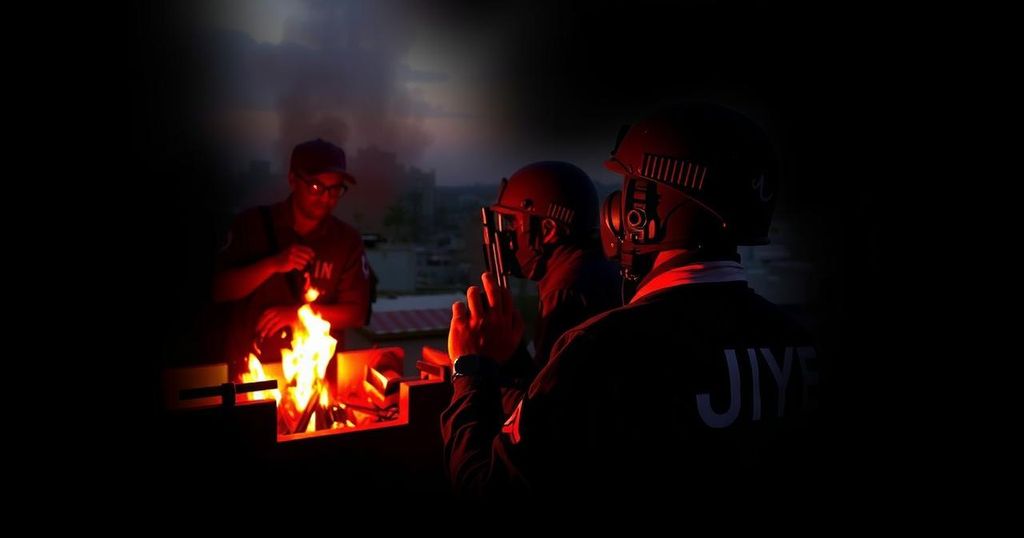Egypt Proposes Two-Day Ceasefire in Gaza for Hostage Release
Egyptian President Abdel Fattah el-Sissi has proposed a two-day ceasefire between Israel and Hamas, which could enable the release of hostages and humanitarian aid delivery to Gaza. Ongoing discussions in Qatar aim to facilitate a resolution amid increased regional tensions following Hamas’ October 7 attack. The situation remains dire, with numerous casualties reported on both sides and humanitarian conditions worsening. Significant challenges persist in negotiating a lasting peace, reflecting the complexity of the conflict’s historical context and the tenuous status of previous ceasefire attempts.
Egyptian President Abdel Fattah el-Sissi has proposed a two-day ceasefire between Israel and Hamas, potentially leading to the release of four hostages held in Gaza. This initiative, announced on Sunday, also calls for the release of certain Palestinian prisoners and the delivery of humanitarian assistance to the besieged coastal territory. As of now, there has been no response from either Israel or Hamas, although discussions are anticipated to continue in Qatar, which is currently serving as a key mediator in the conflict. President Sissi characterized the ceasefire as a step towards “moving the situation forward,” suggesting a desire to engage in negotiations that might pave the way for a lasting resolution. Despite ongoing efforts, previous discussions aimed at achieving a long-term ceasefire have repeatedly faltered. Hamas insists upon the withdrawal of Israeli forces from Gaza as a non-negotiable prerequisite, while Israeli Prime Minister Benjamin Netanyahu has firmly stated that military operations will persist until Hamas is effectively dismantled. Notably, since November of the previous year, a ceasefire has remained elusive. On the day of President Sissi’s ceasefire proposal, the head of Israel’s Mossad traveled to Doha to engage in discussions with Qatar’s Prime Minister and the CIA chief, as part of renewed efforts to curb the ongoing violence and address escalating regional tensions, which have surged since the outset of hostilities following Hamas’ attack on southern Israel on October 7, 2023. This escalation has morphed into a multi-front conflict, with Israel encountering hostilities from both Hamas and Hezbollah, militant groups supported by Iran. For the first time, Israeli forces have openly targeted Iranian positions in response to a missile salvo launched toward Israel. Iran’s Supreme Leader, Ayatollah Ali Khamenei, has called for a measured response to Israeli strikes, refraining from advocating for direct retaliation. In related developments, Prime Minister Netanyahu has claimed that Israel has made significant progress in undermining Iran’s military capabilities, particularly those related to missile production, citing satellite imagery that reveals damage to Iranian military facilities tied to missile and nuclear programs. During a government memorial honoring victims of the October 7 attacks, Israeli Defense Minister Yoav Gallant noted the necessity of making “painful compromises” to secure the hostages’ release, acknowledging that reliance solely on military solutions may prove inadequate. The ongoing violence continues to have dire implications for regional stability. The situation in Lebanon remains tumultuous, with Hezbollah intensifying its attacks against Israeli positions. Recent Israeli airstrikes in southern Lebanon have resulted in multiple casualties, while incidents within Israel, including a truck attack near Tel Aviv, have led to fatalities and numerous injuries, attributed to an Arab citizen. In Gaza, intensified Israeli airstrikes have reportedly caused at least 33 fatalities among predominantly women and children, according to local health authorities. The United Nations Secretary-General has labeled the humanitarian situation in Gaza as “unbearable” for the Palestinian population, with the Gaza Health Ministry reporting over 42,000 Palestinian fatalities since the conflict’s inception. This violence was precipitated by Hamas’ October 7 attack that took approximately 1,200 Israeli lives and resulted in around 250 hostages being captured. The ongoing conflict has left much of Gaza devastated, leading to the displacement of about 90 percent of its 2.3 million residents, marking a tragic chapter in the lengthy Israeli-Palestinian conflict.
The conflict between Israel and Hamas has a long and complex history, characterized by repeated cycles of violence and attempts at ceasefires that often breakdown amidst escalating tensions. The latest round of conflict intensified significantly following a major attack by Hamas against Israel on October 7, 2023, which prompted a severe military response from Israel. The situation in Gaza has resulted in substantial humanitarian crises, exacerbated by extensive airstrikes and blockades, leading to widespread casualties and displacement among the Palestinian population. Egypt, with its historical role as a mediator in the Arab-Israeli conflict, has called for a ceasefire that not only addresses hostage release but also seeks to alleviate the humanitarian situation in Gaza, highlighting the complexity of achieving lasting peace in the region.
Egypt’s proposed two-day ceasefire seeks not only to address the immediate concerns of hostages held by Hamas but also aims to facilitate humanitarian aid and the potential release of Palestinian prisoners. The proposal underscores the intricate dynamics of the ongoing conflict, influenced by international mediation efforts in the region. As discussions continue without initial responses from Israel or Hamas, the path to a durable resolution remains fraught with challenges, reflecting the historical complexities of the Israeli-Palestinian conflict and the broader regional implications of the hostilities.
Original Source: www.newsweek.com




Post Comment